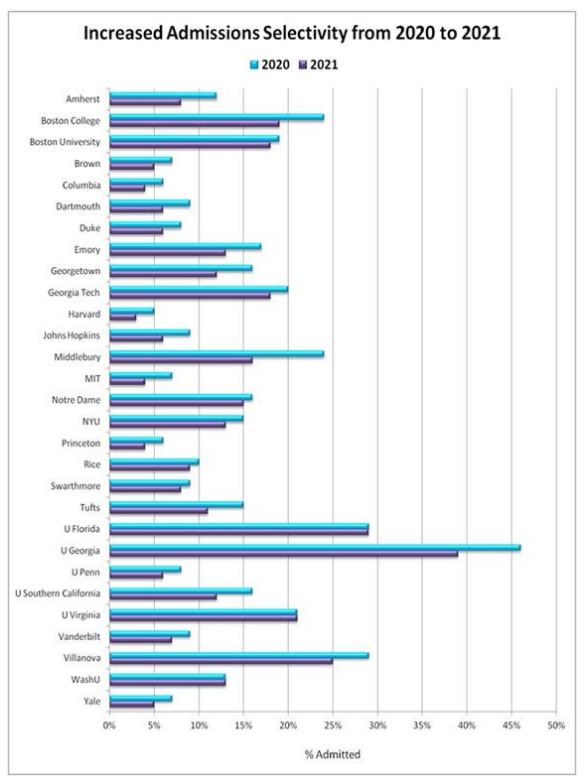I’ve quoted Akil Bello on this blog before and I will do so again here as it was he who coined the phrase “highly rejective” to describe colleges and universities with exceptionally low admission rates. As Jeff Selingo reports in this week’s edition of Next, rates of rejection SURGED this year. Harvard rejected (not deferred or waitlisted – rejected) 97% of its applicants this year. Princeton and MIT were not far behind at 96%. And yet, the average acceptance rate at American universities, as Selingo reports, is 57%. Why are we fixated with the “highly rejectables?” For many, it’s the association of exclusivity with prestige – the teaching, the networking, the opportunities – they all are just “better.”
And yet, as Selingo reports, this exclusivity is not just a product of perceived prestige. It’s also a result of limited supply. Fascinatingly, Selingo notes that since 1980 enrollment at US colleges has increased by 62%. The majority of that chunk has been absorbed by state institutions. Private school enrollment has only grown by 18% and at some, like Boston College and Northwestern, undergraduate enrollment has actually declined! Popular schools on student lists – Princeton, Stanford, Dartmouth, Duke – have only increased enrollment by a combined 2400 students since 1980. Increased demand + barely increasing supply = a lot of people not getting what they want.
Data like this discussed by Selingo is clearly very important for students to consider as they build the list of schools to which they will apply. Being aspirational is wonderful, truly, and there is nothing wrong with wanting something in such limited supply or that which, at first glance, may be unattainable or unaffordable. However, such aspiration needs to be leveraged with an amount of realism. Admission isn’t just not guaranteed, it’s downright unlikely at a handful of schools regardless of a student’s accomplishments inside or outside of the classroom. Knowing this, where else might a student thrive? Hint: lots of places! Thus, as you research schools, looking for places where you believe you’d thrive, review also rates of admission. I believe that there are schools at every strata of “exclusivity” where a student can have a wonderful college experience. Build a balanced list and then see how things play out come decision time.
A final note: I’d like to give a shout out to the seniors I worked with this year. Though still 11 days out from May 1, each has made a decision about where they will be attending in the fall and I am thrilled for them and their families. There were so many acceptances but some waitlists and rejections as well, and with each decision I watched as these students rolled with the punches and weighed their options. I have to confess – I like them all a great deal and believe that these colleges are getting not just smart, motivated students but also genuinely nice and good people. Congratulations all!

